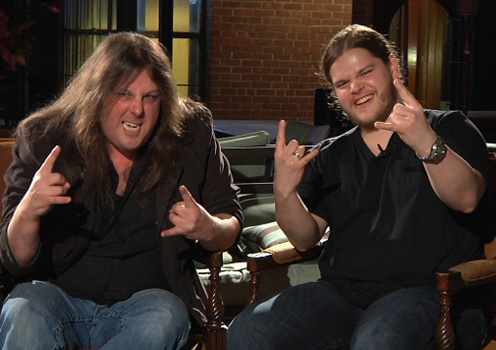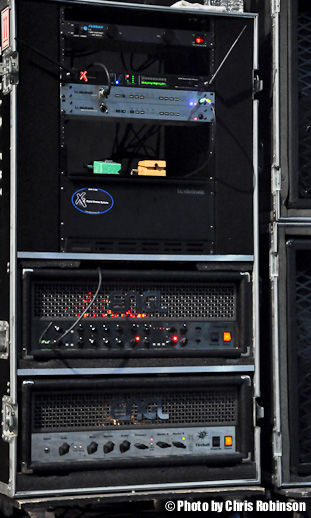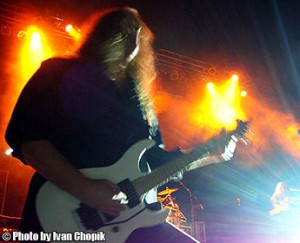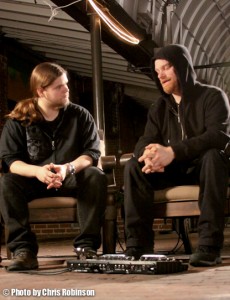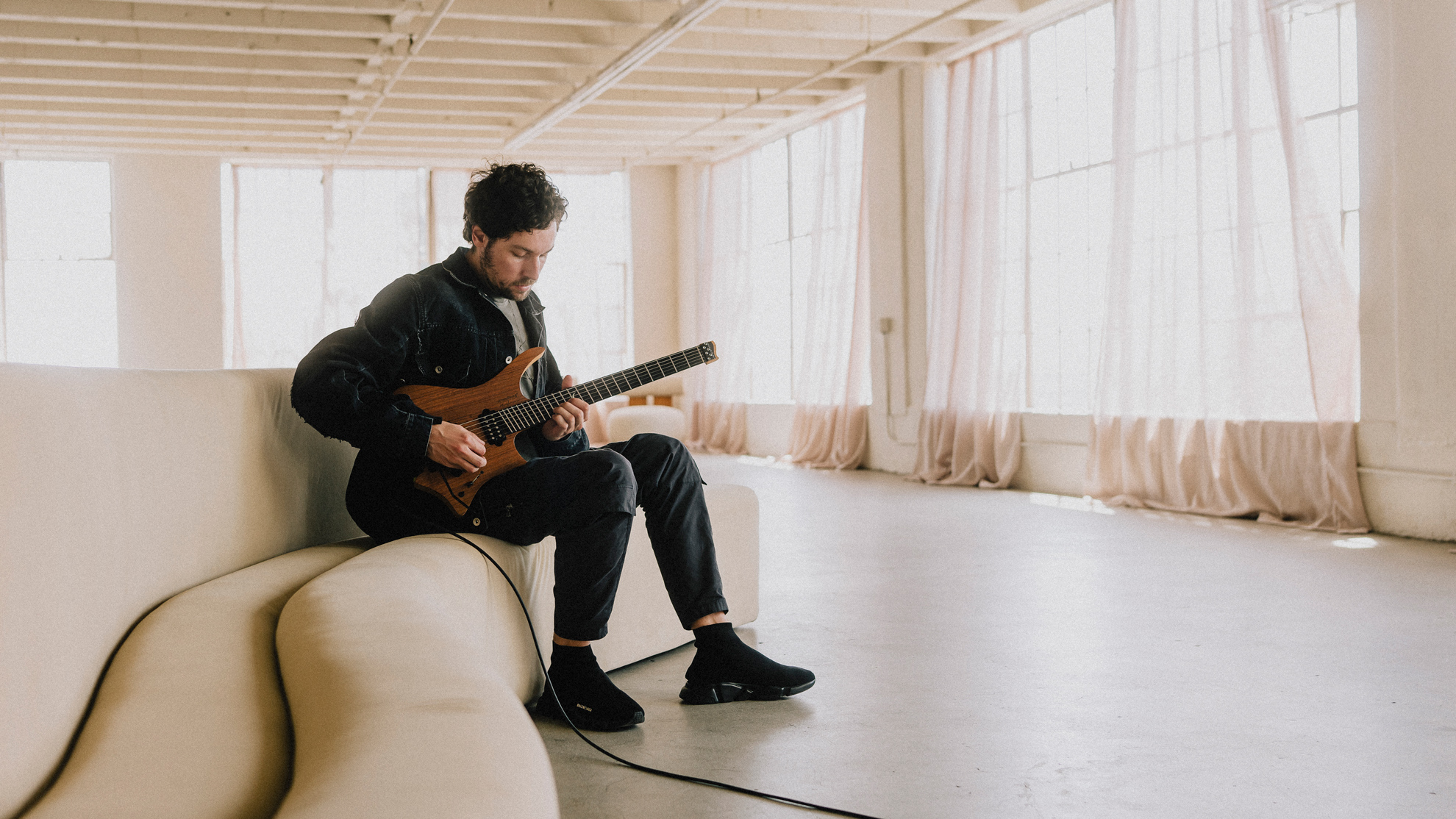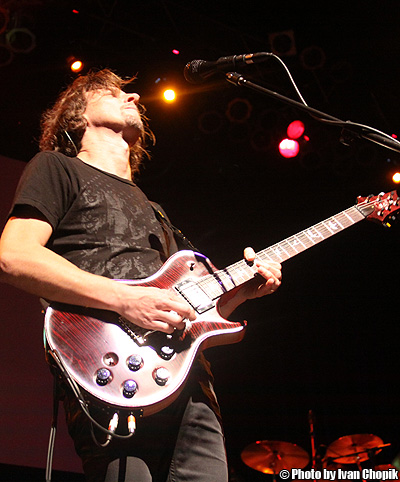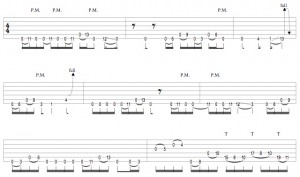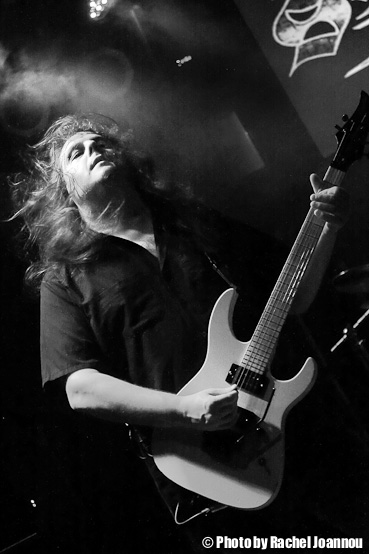 After touring the world in support of their acclaimed release Paradise Lost, progressive metal mastermind Michael Romeo and his band Symphony X returned to their studio, The Dungeon, where the band would craft their newest epic. The resulting record, Iconoclast, amplifies the band’s unmistakable blend of classical influences and progressive metal with some of their heaviest tracks to date.
After touring the world in support of their acclaimed release Paradise Lost, progressive metal mastermind Michael Romeo and his band Symphony X returned to their studio, The Dungeon, where the band would craft their newest epic. The resulting record, Iconoclast, amplifies the band’s unmistakable blend of classical influences and progressive metal with some of their heaviest tracks to date.
The album’s gritty, industrial textures carve a new dimension in Symphony X’s sound, while simultaneously laying a solid foundation for the driving riffage and fluid lead work that Romeo is renowned for. I had the opportunity to catch up and speak with him at Symphony X’s tour stop in Worcester, Massachusetts:
IC: I love the sound of the new record. How did Iconoclast come together and how was that process different from previous records?
MR: Probably the biggest difference is the texturing of it. Basically it’s the same kind of thing – some heavy riffs, some long songs, a little bit more involved arrangements, and some more straight ahead rock and metal tunes. With Paradise Lost, the orchestra and the choirs are in there a lot.
It has that kind of theme – a little darker, a lot of strings, male chanting, bells… that kind of gothic, epic thing underneath the riffs. With this one, we were trying to figure out what we could do that would be cool as an underlying texture, but not do the same thing again.
A lot of times I’ll be doing shit around the house, and I’ll throw on some CD’s or have my computer playing or whatever. Usually, I’ll go back to old Sabbath, and I have a lot of soundtrack stuff too – I love all of John Williams and all the big epic film stuff. I was probably listening to the Matrix soundtrack or maybe the 300 soundtrack even – it has a little bit more of that gritty, industrial… there’s some distorted percussion, it’s a little more modern, a little more intense, and there is some of the orchestra in there.
With some of the initial ideas, I was just screwing around with a heavy riff and laying some texture underneath… maybe something more synthetic or some dirty percussion with distortion. It started taking on that mechanical theme. It just had this machine vibe. So that’s how it started.
It’s like Paradise Lost or The Odyssey, basically, with the music thing, but instead of having the more organic orchestra, it’s all synthetic stuff. I mean, there is some of the orchestral stuff, but it is always laid in with that kinda texture and it’s all subtle. It doesn’t sound like an industrial record or something. You can’t take it the wrong way – it’s tucked in there, it’s just a little bit of an atmospheric thing going on. But it’s still frickin’ heavy, still has all the shit going on.
IC: Yeah, I mean Symphony X without the orchestral aspect – I can’t even imagine what that would be like. It’s so integrated into the music.
MR: Yeah, I love all that shit, you know? We just didn’t want to do the same thing. Even though the music is different, we were just trying to find something to add to it even more… maybe not totally change it, but just add something kinda cool.
Every album I just get some basic riffs, or put together something with a drum machine to hear what’s going on. And there was some stuff with the orchestra, and I’m like ‘yeah, that sounds cool, but what else? What else can we throw in there?’ And it was probably just listening to the stuff I said and it evolving from there.
IC: What about the actual recording process? The last couple of albums came out of your home studio – The Dungeon. Was that the case this time as well?
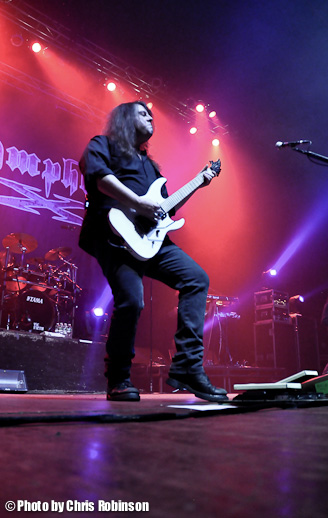
MR: Yeah, and for us it’s cool and it’s not cool. It’s cool because we can take our time and a lot of the time we’re actually writing. I’ll spend a couple months getting together the riff, basic song outline, putting some bullshit keyboard parts in just to let everybody get an idea – ‘here’s kinda what I’m thinking,’ and then let everyone come in and build on it.
Once we start recording, it’s always open. ‘Maybe we should go do another verse here, or maybe we should extend this solo here, or maybe whatever…’ So while we’re recording, we’re still writing. And since there’s no time restriction, it’s cool sometimes, because we’ll be done whenever we’re done. But the bad thing is we’ll be done whenever we’re done. So months go by, and we’re still fucking around with one song and everybody goes ‘what the hell are you doin’ down there? Are you done yet?’ and all that shit.
But I like the way that we have it, because a lot of the stuff does happen as we’re recording. I think there’s something about that spontaneity… instead of practicing a guitar solo for months and saying ‘I’m gonna record it today,’ I’d just rather hit the record button and see what happens, you know?
And it’s the same with Russ [Russell Allen, vocals], too. Sometimes he can be too over-rehearsed and thinking about it. But sometimes he’s just like ‘oh, let me go in there and try something.’ I’m like ‘go ahead man,’ and he goes in there and it’s like ‘dude, that’s fucking perfect! Great! Moving on.’ Ever since we’ve started doing stuff at my place, that’s always been the way that we’ve been doing it.
IC: Did you engineer everything as well?
MR: Yeah. And it’s cool and it sucks, because it’s a lot of work. But once everything’s set up and we’re in the zone, it’s fine.
IC: When your solo album, The Dark Chapter, and Symphony X’s self-titled debut came out in the mid-90’s, they initially picked up in Japan. Eventually, you gained popularity in Europe, and then here in the US. Do you still find the relationship between these different markets to be similar to how your records are received today?
MR: I think now everything’s spread a little more evenly. Back when we did the first record… I mean, even the first record I consider a demo. We were kind of a band but we were thrown together so quickly. I’d done The Dark Chapter and that got some interest from a Japanese label. I had the bass player Tom [Thomas Miller, former bassist], whom I played with in high school, so he was around.
And then a friend of mine knew [keyboardist Michael] Pinella. He worked at a music store. Tom and I knew the singer Rod [Tyler] from another band. So it was kinda like throwing guys together… the first record I think is just a demo. Even the recording wasn’t too good. It was so long ago; we didn’t know what the hell we were doing.
IC: I would love to hear some of the material re-recorded sometime.
MR: Yeah, we talked about doing that. And then the other thing is the material itself. Back then, I think we all thought differently and then over the years you just kinda… probably if we were doing the first record and we were talking about some of this industrial texturing, I think we’d be like ‘pff, we’re not doing that!’ Or with too much of the orchestra, it’s like ‘oh man,’ you know? Because I think back then it was just a different thing.
IC: Can you describe some of the highlights and low points of your career throughout all those years? What are some moments that stand out?
MR: I don’t even… there’s so many, man. We’ve been lucky that every album does better for us. So every day, it’s good. The first record we put out, it was only in Japan and at that time here the whole grunge thing was going on and no one gave a shit about guitar playing. It was the total opposite of years before, like when I first started playing.
![]()
You had Van Halen, you had Malmsteen, Paul Gilbert, Vai, Satch… you had all these player guys and that’s what I was into. And the band… we liked Rush, Priest, Maiden, the metal, the progressive stuff and all that. Here at that time is was all the grunge thing taking over, and there was really nowhere for us to play. We probably couldn’t get a record deal if our life depended on it here.
Luckily, in Japan they still liked the player stuff, so that’s how that whole thing happened in Japan first, and then eventually in Europe. And I think over the years, too, just the material… the last couple albums we’ve just been going back to the metal thing. Just me personally thinking, ‘man, when I was younger putting on that the new Priest record or something, it was like ‘fuck yeah.’’ So I’ve been going to back to the riffs.
IC: I can definitely hear the last few albums getting darker and heavier. Would you say that’s the case with Iconoclast as well?
MR: Pretty heavy. It’s not like stupid heavy, but for us it’s that blend, it’s that balance. It’s pretty heavy, but a lot of the choruses concentrate on the melody, and this whole texturing thing with the orchestra, and some of these industrial, kind of mechanical, synthetic things. It’s just an evolution over time of doing our thing.
IC: Let’s talk some gear. How has your rig changed over the years? Last time we spoke your live rig was centered around the Line 6 Vetta amp.
MR: I used an ENGL on The Odyssey for the rhythm stuff and probably a lot of the solo stuff, but at that time I had been using Line 6 live. It was so easy – you had the head and the pedalboard all contained. So it was easy to bring around.
But I really liked the guitar sound on The Odyssey and then eventually I just brought out all the ENGL stuff live and that’s what I use now. So I have the Powerball as the main head, and I have a Fireball, and I’m using a TC G-System for chorus and delay and all that. It’s split in stereo, so that’s why the two heads. And that’s it – really simple.
IC: Is that what you used on Iconoclast as well?
MR: Yeah, I used the Caparisons and the ENGL and that was it.
IC: Do you boost the front end of the ENGL with a Tubescreamer or anything?
MR: Yeah, once in a while. The ENGL has a lot of gain, so just plugging straight in – it’s a lot of gain. So I’ll back it down maybe 9 o’ clock, maybe add a little Tubescreamer, but I have certain patches where there’s no Tubescreamer. It just depends.
Sometimes with the Tubescreamer you get a little bit more definition. I think there’s a couple of solos that are slower, a little more the melodic where I turn it off. I just bypass it, so the head is a little more open, you know? But yeah, I’m always noodling around.
IC: Any new studio gear?
MR. Lots! All the time man, that’s where all my money goes.
IC: If you had to pick one piece of gear that made the biggest difference on this record, what would you say that would be?
MR: Before we started recording I bought a couple of new preamps that I needed. Because I have no real big console in the studio, it’s all outboard gear. I had a couple of Neve preamps, and then I went and got some SSL’s before we started this. I have some compressors, like the 1176. Pretty basic, normal stuff, but I think now I have a good amount and a good choice. Different mics, too. As far as the whole front end, that’s pretty much what it is.
And then on the software end, you would think that all the hardware is expensive and then you look at some of the software, and it’s like ‘what the fuck? These prices are insane!’ With the software, probably the biggest thing over the last couple of albums that helped is the Vienna Symphonic library. It’s the best I think. I mean, no one can touch that thing and it adds a lot.
Paradise Lost was the first time I was kind of getting into it. And now I got it all full-blown. There’s a lot of software things, especially with some of the texture stuff, just like the little odds and ends kinda thing. I definitely have so much stuff to choose from.
IC: What’s your typical guitar signal chain, starting from the mic? What’s your mic of choice? How do you route it?
MR: Well, we’re always running late, so what I’ll usually do is I’ll just have my reamp going in. I’ll play through my amp to feel, and I’ll print it. But usually for me, I’m a night dude, I’m up doing guitars at like 4 in the morning. Wife and kids are upstairs trying to sleep and the studio has some sound absorption going on, but when the amp’s at like 10 dude, no way…. So I’ll record at a moderate volume to do my thing, but I’ll print the reamp track. Last time Jens Bogren did some of the reamping on the guitars.
IC: Did he also mix this album?
MR: Yeah, he mixed this one. And this time there was a guy that I’ve known for years – Eric Rachel at Trax East studios, a good friend of mine, and I told him ‘Man, I’m getting backed up here. I have these reamp tracks, let me bring my Powerball down there.’ And he has a nice, big room, so he actually put up some room mics for the guitars, which was cool. But usually if I’m home if I’m doing it myself or trying to do it, it’s a [Shure SM]57 on the cabinet, right into the Neve with as little EQ’ing as I can. And no effects either, just into the head, dry.
IC: So you do all the rest in the mix?
MR: Yeah. Jens did such a good job with mixing the last record, so it’s like ‘yeah dude, do whatever!’
IC: In terms of your lead guitar playing, there are always some new things for us to check out with every record.
MR: I try! Running outta shit to do! [laughs]
IC: Is there something in particular that you’ve been working on for this record, just in terms of guitar playing?
MR: Not anything in particular. There’s always one or two solos where I try to find something cooler to do, and maybe only do it on that song. Like the last record, in the song ‘Eve Of Seduction,’ trying to do this glissando with the pick. And that’s cool – don’t do it on any other song, let that be its’ one cool thing. And on this one I’m trying to think the same way. I think on the first song there might be like a whammy pedal thing going on.
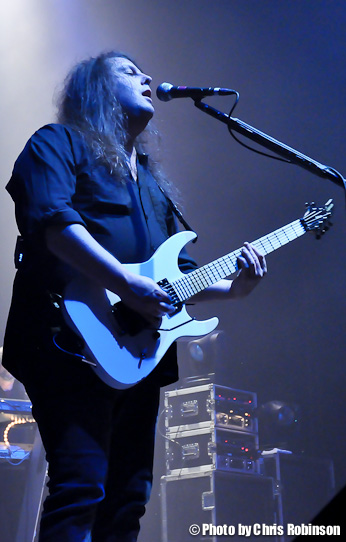 I’m just trying to make the solos fit, too, you know? If it’s a melodic song, I try not to overplay or I try to play the right feel for it. A lot of times it’s just hit the record button and see what happens. It’s like, ‘oh man, maybe if I did this thing and I had the Whammy jump an octave. Alright I’ll plug the whammy in. That’s cool, but let me unplug it for the next thing.’ I’m just trying to find what’s right for each song.
I’m just trying to make the solos fit, too, you know? If it’s a melodic song, I try not to overplay or I try to play the right feel for it. A lot of times it’s just hit the record button and see what happens. It’s like, ‘oh man, maybe if I did this thing and I had the Whammy jump an octave. Alright I’ll plug the whammy in. That’s cool, but let me unplug it for the next thing.’ I’m just trying to find what’s right for each song.
IC: There are a few moments on a couple of the previous records where you’ll go into bluesy mode, and I love hearing that. Is there much of that sound on Iconoclast?
MR: Yeah, I think so. Especially with this record, some of the blues things are maybe a little more appropriate, you know what I mean? With the more neoclassical kind of thing, I would stay in that way of thinking. A song like ‘Smoke and Mirrors’ is definitely more classical sounding and then for the solo it’s the Malmsteen kinda thing, and that’s what works.
There are a couple of songs, like ‘Serpent’s Kiss,’ where it’s more of a heavy riff and with the solo I’m just thinking ‘well, maybe the neoclassical thing really ain’t gellin here. Maybe I’ll just do a little blues thing with a whammy at the end or something.’ It’s whatever fits. Nothing wrong with playing some blues licks!
IC: Last time we spoke and I asked you for advice for upcoming musicians, and you were talking about being able to take in different influences and not just confining your influences to a set number of artists or even one guitar player.
MR: I still believe that.
IC: Is there another piece of advice that you can share with aspiring guitarists and musicians trying to make their way in the industry?
MR: Yeah, I still think that’s a pretty big thing. Talking about the older stuff that we would do, me and Pinella had the classical thing in common. He was coming from a classical background and I liked that stuff, too. But I think back then I was more… I think if I had heard [Igor Stravinsky’s] ‘Rite Of Spring’ way back then, I wouldn’t have liked it. But years later, that’s the shit.
IC: But it took going through what you went through before to come to a point where you could appreciate that piece.
MR: That’s what I’m saying. I think me, personally, I wouldn’t have given it a chance. I was young, you know? And you kinda get stuck in a way of thinking… a little stubborn. You kinda think you know everything. Aside from guitar guy influences and stuff like that, even about music in general.
Even if you don’t like Jazz, there’s just something you can get from anything I think. I think for this band, that’s helped the most. This new record – I’m talking about like The Matrix or 300, and it’s like ‘what the fuck does that have to do with metal?’ but there’s something that you can get out of it, make it cool, and make it your own thing. So yeah man, just gotta be open-minded, I think.
IC: For sure. Plus I think 300 definitely has something very metal about it, just in general. [laughs]
MR: Oh yeah dude, it’s badass. That’s something cool to kinda, I don’t wanna say steal, but borrow ideas from some of the things going on there. You take that, and you put it over a tough riff man, and cool shit happens! Cool shit evolves I think, if you just give it a chance. That’s my advice – listen to everything!
IC: Obviously so much of you time is dedicated to Symphony X, writing music, recording, and being on the road… Who is Michael Romeo outside of music? What are you into and what do you do when you’re not making music?
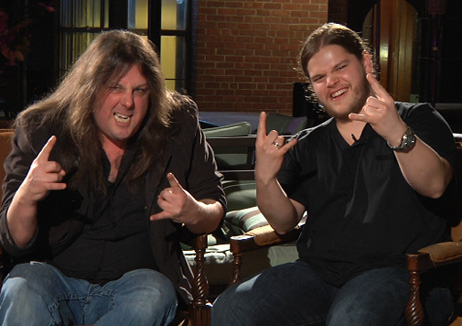
Michael Romeo and Ivan Chopik
MR: Man, this is it! It’s so much and it’s so time consuming. Aside from that, I’m a normal dude. I just put in a new sink in my house and I gotta do my roof when I get back. The same shit, you know? My basement’s a mess, so I gotta clean my basement. I try to balance [music] with the home stuff.
For us the writing takes a lot. Once that starts, for me, that’s pretty time consuming. I’ll just go down there all day and try to start building the basic songs or trying to find some cool riffs, or something different.
IC: Is the writing aspect something that once it starts you have to keep going with it, as opposed to coming back to it and going back and forth?
MR: Yeah, I think I’m a workaholic a little bit. But it’s not work – I love it! I work a little and then go hang with the kids – get my ass kicked on some video games. Kids today, it’s just like they’re crushing me. They used to think I was good and now I’m like ‘what the fuck!?’ My typical day like that: I get up, make a big ol’ thing of coffee, and I head down in the studio and I either plug in and start noodling around, or maybe listen to some stuff, put on some different things.
Sometimes I’ll put on things that I maybe haven’t heard in years. Like The Matrix and or 300 – it’s not something I listen to every day, but I got this soundtrack a friend of mine gave to me, and he knows I like that stuff, so I’m like ‘yeah, let me check this out.’ And then all of a sudden the wheels start turning, and you’re like ‘ooh, you know what? This could be pretty cool if… ‘ and then the whole day goes by and it’s dark out and you go to sleep and the next day same shit. That’s it man, that’s me. Just average Joe.
[Special Thanks to Rachel Joannou (rjimagesphotography.com) and Chris Robinson (myspace.com/infinitedescent) for their wonderful photos, and Cigar Masters of Worcester, MA for their warm hospitality.]



